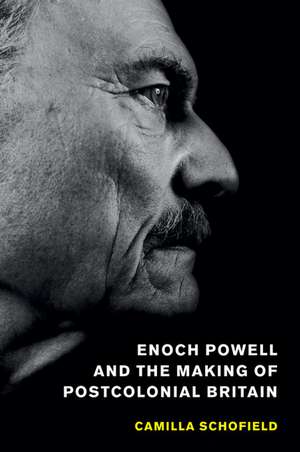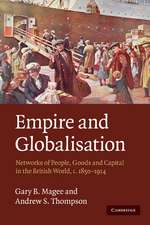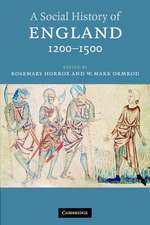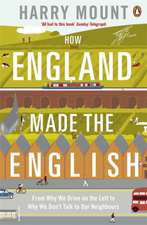Enoch Powell and the Making of Postcolonial Britain
Autor Camilla Schofielden Limba Engleză Paperback – 25 noi 2015
| Toate formatele și edițiile | Preț | Express |
|---|---|---|
| Paperback (1) | 321.74 lei 6-8 săpt. | |
| Cambridge University Press – 25 noi 2015 | 321.74 lei 6-8 săpt. | |
| Hardback (1) | 757.52 lei 6-8 săpt. | |
| Cambridge University Press – 2 oct 2013 | 757.52 lei 6-8 săpt. |
Preț: 321.74 lei
Nou
Puncte Express: 483
Preț estimativ în valută:
61.59€ • 63.38$ • 51.92£
61.59€ • 63.38$ • 51.92£
Carte tipărită la comandă
Livrare economică 28 februarie-14 martie
Preluare comenzi: 021 569.72.76
Specificații
ISBN-13: 9781107595477
ISBN-10: 1107595479
Pagini: 384
Dimensiuni: 150 x 230 x 22 mm
Greutate: 0.51 kg
Editura: Cambridge University Press
Colecția Cambridge University Press
Locul publicării:New York, United States
ISBN-10: 1107595479
Pagini: 384
Dimensiuni: 150 x 230 x 22 mm
Greutate: 0.51 kg
Editura: Cambridge University Press
Colecția Cambridge University Press
Locul publicării:New York, United States
Cuprins
Introduction; 1. Conservative war, 1938–47; 2. Liberal war, 1947–60; 3. Without war? Commonwealth and consensus; 4. The war within, 1968–70; 5. Naming the crisis; Conclusion; Postscript: Enoch Powell and Thatcherism.
Recenzii
'Just when one thinks Enoch Powell lies dead and buried, like a traumatic memory back he comes, hitting the headlines and vibrating across the airwaves. In poised, incisive prose Camilla Schofield explains why this is so. Drawing on exemplary research she places Powell back in the history which made him.' Bill Schwarz, Queen Mary, University of London
'Camilla Schofield offers an original and arresting antidote to what, sadly, remains the conceptually unimaginative and overly compartmentalized historiography of post-1945 Britain. She cleverly tracks the myriad ways in which social class, race and nation were intrinsically linked, not merely in Powell's overheated fantasies of social disorder, but in British postwar politics and culture more generally. One great strength of this study is its recognition of the fact that political meaning cannot be divorced from private histories … Most critically of all, Schofield provides further evidence of the benefits to be accrued from recognizing the fundamental interconnectedness between the histories of, on one hand, the experience and memory of World War Two and, on the other, Britain's prolonged and traumatic transition to a postcolonial society.' Martin Francis, Henry R. Winkler Professor of Modern History, University of Cincinnati
'This groundbreaking book scrutinizes Enoch Powell as a figure in history - as a figure through which the reader has a sense of what it was like for someone of his generation (and generation is of critical importance) to live through and contribute to the shaping of a time of significant change in Britain.' Sonya Rose, Emeritus Professor of History, University of Michigan
'This is the definitive account of Enoch Powell's poisonous politics. Schofield's illuminating corrective to the hagiography that has dominated analysis of his contributions so far is as welcome as it is overdue. He emerges here as both avatar and architect of Britain's postimperial pathologies.' Paul Gilroy, Kings College London
'… provides a definitive and corrective account of Enoch Powell the man … Schofield shows that Powell's influence in British politics began before and extended well beyond the 'Rivers of Blood' speech.' Michael Higgs, Race and Class
'In this excellent study, Camilla Schofield shows how Powell's politics were both defined by his historical moment - by the experiences of war and colonialism, postwar, and postcolonialism - and definitive in bringing these moments together, reworked into a new populist politics of race that challenged the existing consensus on race relations and the Commonwealth.' Rob Waters, Twentieth Century British History
'This is an engaging, thought-provoking book … Schofield is to be commended for bringing a fresh approach to a subject often associated with a single event. Her account of Powell situates him firmly in the international and domestic matters of the post-war period as a whole and demonstrates the ways in which he came to articulate the fears and anxieties of those equally disturbed by a changing nation and world.' Amy Whipple, Reviews in History
'Schofield's biography is vital to rethinking the periodisation of twentieth-century British history, re-evaluating the notion of 'rupture' between the war and its aftermath, and usefully bringing together decades that are often severed from one another. She aids us in understanding the full arc of post-war British history, including the radicalisation of British politics in the 1980s. She dissects the relationship between Powellism and Thatcherism, charting how Powellism made Britain ready for Thatcher's crusade … this is a book of exceptional power and promise, which deserves the widest possible audience.' Jordanna Bailkin, The English Historical Review
'[A] penetrating study.' Times Literary Supplement
'Written with clarity and insight …' New Statesman
'Camilla Schofield offers an original and arresting antidote to what, sadly, remains the conceptually unimaginative and overly compartmentalized historiography of post-1945 Britain. She cleverly tracks the myriad ways in which social class, race and nation were intrinsically linked, not merely in Powell's overheated fantasies of social disorder, but in British postwar politics and culture more generally. One great strength of this study is its recognition of the fact that political meaning cannot be divorced from private histories … Most critically of all, Schofield provides further evidence of the benefits to be accrued from recognizing the fundamental interconnectedness between the histories of, on one hand, the experience and memory of World War Two and, on the other, Britain's prolonged and traumatic transition to a postcolonial society.' Martin Francis, Henry R. Winkler Professor of Modern History, University of Cincinnati
'This groundbreaking book scrutinizes Enoch Powell as a figure in history - as a figure through which the reader has a sense of what it was like for someone of his generation (and generation is of critical importance) to live through and contribute to the shaping of a time of significant change in Britain.' Sonya Rose, Emeritus Professor of History, University of Michigan
'This is the definitive account of Enoch Powell's poisonous politics. Schofield's illuminating corrective to the hagiography that has dominated analysis of his contributions so far is as welcome as it is overdue. He emerges here as both avatar and architect of Britain's postimperial pathologies.' Paul Gilroy, Kings College London
'… provides a definitive and corrective account of Enoch Powell the man … Schofield shows that Powell's influence in British politics began before and extended well beyond the 'Rivers of Blood' speech.' Michael Higgs, Race and Class
'In this excellent study, Camilla Schofield shows how Powell's politics were both defined by his historical moment - by the experiences of war and colonialism, postwar, and postcolonialism - and definitive in bringing these moments together, reworked into a new populist politics of race that challenged the existing consensus on race relations and the Commonwealth.' Rob Waters, Twentieth Century British History
'This is an engaging, thought-provoking book … Schofield is to be commended for bringing a fresh approach to a subject often associated with a single event. Her account of Powell situates him firmly in the international and domestic matters of the post-war period as a whole and demonstrates the ways in which he came to articulate the fears and anxieties of those equally disturbed by a changing nation and world.' Amy Whipple, Reviews in History
'Schofield's biography is vital to rethinking the periodisation of twentieth-century British history, re-evaluating the notion of 'rupture' between the war and its aftermath, and usefully bringing together decades that are often severed from one another. She aids us in understanding the full arc of post-war British history, including the radicalisation of British politics in the 1980s. She dissects the relationship between Powellism and Thatcherism, charting how Powellism made Britain ready for Thatcher's crusade … this is a book of exceptional power and promise, which deserves the widest possible audience.' Jordanna Bailkin, The English Historical Review
'[A] penetrating study.' Times Literary Supplement
'Written with clarity and insight …' New Statesman
Notă biografică
Descriere
A radically revisionist account of the life and political career of Enoch Powell.
















